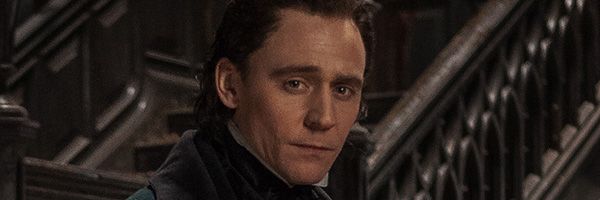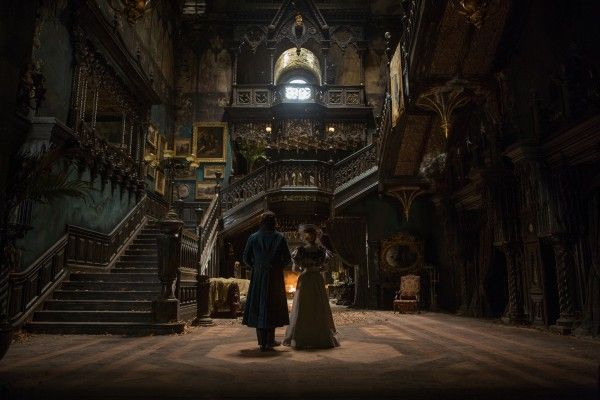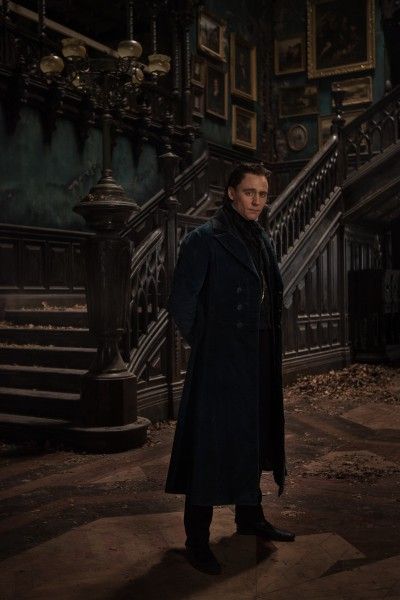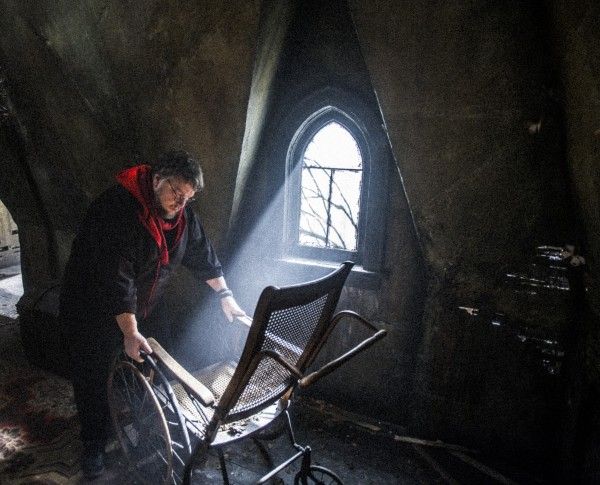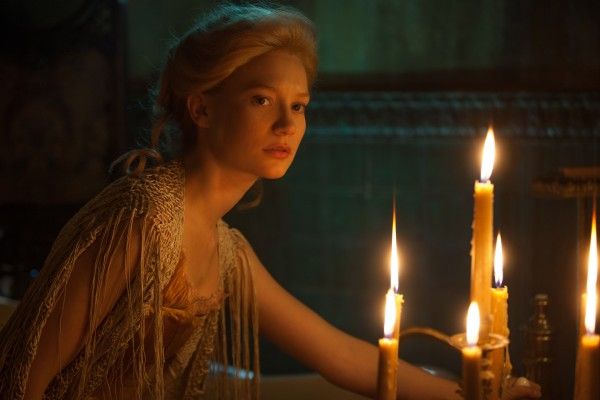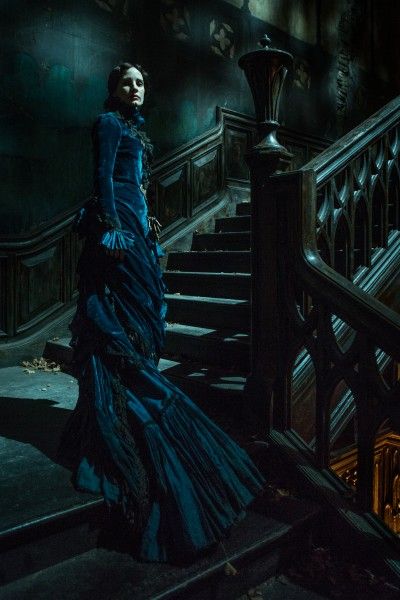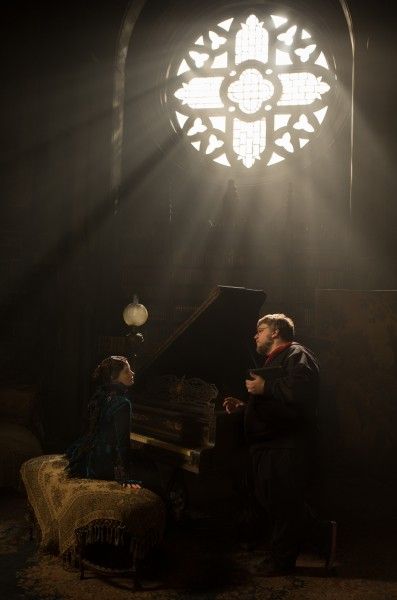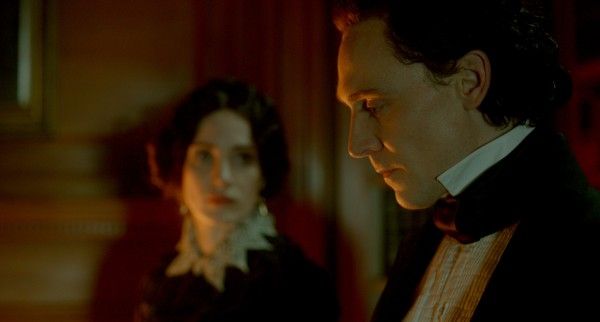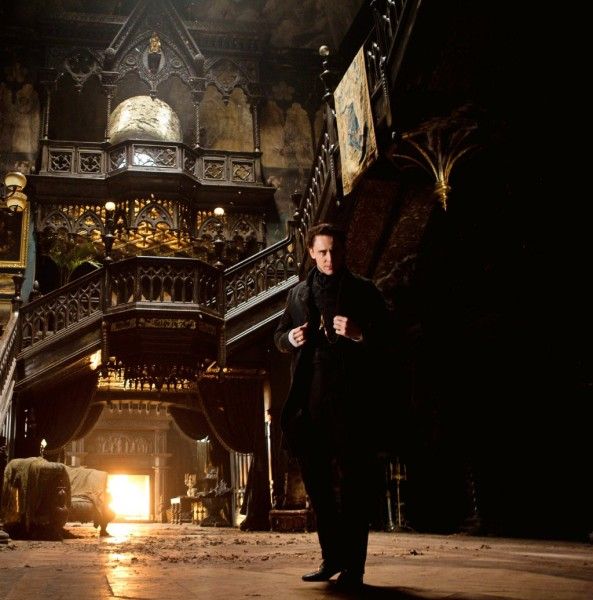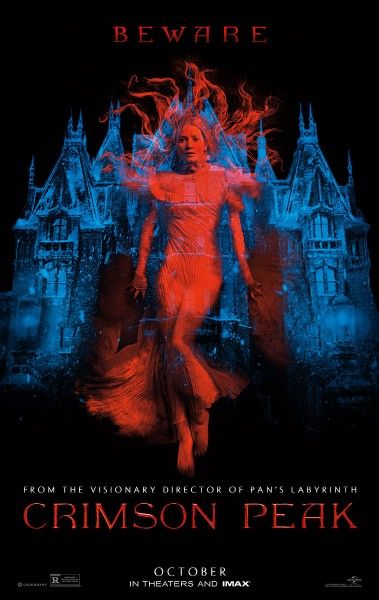One of the many reasons why I’m a fan of Tom Hiddleston is that he’s always a great person to interview. No matter the question or time of day, he’ll always give you an interesting answer and reveal new things about his character without spoiling the film. And he was true to form last year on the set of Guillermo Del Toro’s Crimson Peak. I got to visit the set with a few other reporters when the production was filming in Toronto, and during a break in filming, Hiddleston sat down with us for an extended interview.
He talked about getting to work with Del Toro, the detailed back stories that were created for all the actors, why he wanted the role when Benedict Cumberbatch dropped out, the relationships between the main characters in the film (played by Mia Wasikowska, Jessica Chastain and Charlie Hunnam), progressing from romance to kink, his character's back story, and so much more. It’s a great interview that offers up a lot of new information on the film without spoiling it.
Crimson Peak opens October 16th. [Update: We've been asked by Universal not to run the audio, so we've removed that from the article.]
Finally, before getting to the interview, I suggest watching the new trailer first.
Question: Talk a little bit about working with Guillermo Del Toro and what you thought it would be like and what it actually happened like.
TOM HIDDLESTON: He is amazing. I mean, that probably isn’t a secret from everyone else who’s ever worked with him but he’s like this great Mexican bear of passion and warmth. He is just so inspiring, he loves his job and, I think, as a working experience and collaboration he’s one of the most inspired and inspiring people I’ve ever worked with. His knowledge about everything is so deep, he knows how to do everyone’s job and he’s very, very special, really inclusive. Just everything, from the very first moment I met him, has been about enthusiasm and expansion and love and a good time, as well. This crew was working 16-hour days and they would follow him into war, 16-hour days never felt so short because it’s such fun.
When Benedict Cumberbatch dropped out, Guillermo sent the script to you and he said that you turned around almost immediately and accepted, I think he said within 72 hours.
HIDDLESTON: Yeah.
Was it based on him, or was it based on the script, or was it based on – What was it that made you say, ‘This is definitely a part worth taking’?
HIDDLESTON: Well, it happened very quickly. He called me, my agents called and said, ‘Guillermo Del Toro is going to call you in the next hour’ and he called me and told me the story and he said, ‘Don’t say yes, or no. But I’m gonna rewrite the script this weekend or tonight or tomorrow, and I’m gonna send you a new draft’ and like an hour later Jessica [Chastain] called me and said, ‘You have to do it’ [Laughs] ‘I want you to do it, and Guillermo wants you to do it’ and I was really excited I couldn’t wait to read the script. Then, it must have been like a day later, I got it and I read it immediately in one sitting and he had rewritten the role, so I got sort of my own draft, he had rewritten the part for me in a way. It’s just brilliant, it just is a brilliant screenplay, and I wanted to work with him, I knew that Jessica, and Mia [Wasikowska], and Charlie [Hunnam] were locked in and on board; and I love Mia and I know Jessica from before and I wanted to work with Charlie so there was just no possible way I was going to say ‘no’. Working with Guillermo who I’ve admired for so long, and the script itself was just brilliant, the screenplay was captivating and rich and sophisticated and terrifying; and the role was amazing, and different than anything else I’d done, It was a very, very quick ‘yes’ after that.
Do you have any idea what the changes were that he made to make it for you specifically?
HIDDLESTON: I don’t know actually, I don’t know. [Laughs] You would have to ask him. The character is quite emotionally complex, he has shades of light and dark in him and perhaps that’s something I’ve done before, I don’t know. I think maybe he changed the age or he changed certain aspects of his physical disposition or something, I don’t know. It didn’t seem particularly tailor-made but it seemed like a part that I could play and I really wanted to play, as well.
Can you go over your relationship with the two ladies, how they might bring out different aspects of the character? Because Jessica told us earlier just about the similar relationship and how it’s co-dependent from her perspective.
HDDLESTON: It’s really interesting I’ve read a book –Literally, I’ve been reading a book all day called The Politics of Family by R. D. Laing who’s a very famous psychologist from the ‘60s, and he talks about the difference between the subjective experience of someone within the family unit and then the public definition of what that family unit comes to be, and essentially that the gap between the two in every family is often quite wide; and there’s always a tussle about who gets to define what the relationship is in a public context within the family. So I think Lucille [Sharpe] and Thomas [Sharpe] would disagree about what the nature of the relationship is and who does the talking, who does the listening, and who does the leading, who does the following. But they are both… [Laughs] Sorry I’m trying not to reveal things that I don’t want you to know. They’re both orphans and have lived together, it’s the late 19th century, so it’s obviously a time when a women’s power is expressed through the capacity of the men closest to her. That’s sadly the situation, and so her proximity to her brother is one of co-dependency in that she’s invested in his success in the world, and he feels very protective of her as well but not just because of their isolation, because they’re orphans. The thing of sibling who are close in age, who have been left alone and who need each other and who depend on each other, she’s older he’s younger; but he has a career, he’s a brilliant really deeply gifted craftsman and engineer who may have gone on to become someone like [Henry] Bessemer or [Isambard] Brunel, that’s actually like a God-given talent that he has, he’s a gifted craftsman so he’s brilliant with his hands and his great ambition his brain child is to revolutionize clay mining in the north of England in the last decade of the 19th century, early Victorian era; and if his scheme works, he has this great dream of he’s built this machine –which I saw today which is mind-blowing. I’ve pitched to Guillermo a whole 20 minutes of There Will Be Blood 2 [Laughs] where it’s just me and the machine and he’s like, ‘Yeah man, then we’ll fucking do it. Why not?’ [Laughs].
But if Thomas Sharpe’s dream works, if he gets the investment and the financial capital to put into his scheme, he could be one of the great engineers of the Victorian age; and of course she’s invested in that because it means that their whole life would change; and they are destitute, they live in Allerdale Hall, which is the location of the Crimson Peak, and it’s a mansion they’ve inherited. In the classic case of old money, they’ve inherited this huge pile of crumbling bricks which they don’t have the resources to refurbish, so they have all the old paintings and all the old clothes and the leaky roof and damp, it’s essentially sinking into the clay which is underneath the house; and his dream is to make use of the riches in the soil and earn the revenue to redo the house and then who knows after that.
So does that mean his relationship with Edith [Cushing] is based on genuine love or is that…?
HIDDLESTON: Oh, this is the fascinating thing, I think the film opens –and I’m not spoiling anything by saying it– is Thomas and Lucille, they are old money from the north of England who essentially are borderline destitute and he’s brilliant and she’s quite shy and retiring and they go into the new world, they go to Boston to Massachusetts where everything is full of hope and graft and optimism looking for investment, looking for investors in the machine, in Sharpe’s machine, and he falls in love with a sort of prodigious and slightly willful young woman who’s rebelling against her own father; and they have just a spiritual connection about certain things, they just get each other, and I think he doesn’t expect to fall in love. He’s ostensibly gone to America for business reasons and he meets this young girl who writes her own novels and won’t be told what the content of those novels should be by prospective publishers, and they think they can tell this young woman what to do and she writes her own stuff and he loves it and they make a connection and it’s incredibly romantic after the manner of the great gothic romance novels; and there’s a big ball and they dance and look into each other’s eyes and fall head over heels in love which is really against the wishes of many, many people in the room who have other plans for their family members.
So that’s what I think it is, and so I think they both bring out different aspects, to answer your question, they both bring out different aspects of him. Lucille I think he feels very responsible for Lucille, he feels he needs to look after her, to protect her, she’s a very delicate vulnerable woman, and given their family history will need a great deal of care and attention so on one level he’s pulled home by Lucille, he’s reminded of home, he’s reminded of the past, of the pain of the past, and the experiences of the past. But Edith is this light that’s pulling him away from home that represents new experiences and travel, and she’s the future, she’s the light in his life, I think.
You said ‘romance’, while Guillermo gave us ‘kink’.
HIDDLESTON: [Laughs]. There is kink. It begins with romance and progresses to kink, but I’m not gonna…
How do you define that in your vocabulary, what’s ‘kink’?
HIDDLESTON: It’s really kinky, you’ll see why.
I don’t see anything kinky. What’s kinky?
HIDDLESTON: In my life, in my work, or…? I called Scarlett Johansson a mewling quim.
[All laugh].
HIDDLESTON: You know, there is a sexuality in the film which is expressed and you think you know what it is and then you realize you’re only scratching the surface. So… [Laughs] I really can’t reveal more than that. Thomas Sharpe has, and he’s not the only character in the film, but he has a history and I suppose the interesting thing about the film, the story, is it’s about the difference between expectation and reality and each character is sort of projecting certain things. Like, you got Thomas, Lucille, Edith and Michael; and they’re all projecting onto each other and have certain expectations of who the other might be and then when the masks are pulled away you see a very different picture; and that might be where the kink emerges. Without spoiling things too much.
How aware is your character of the living, breathing entity that is the house and the supernatural elements that are going into it?
HIDDLESTON: I actually talked to Guillermo about that this morning. I think it’s really interesting in the kind of quartet of the central characters, Thomas’ journey is one of revelation where he thinks he knows who he is and what he’s inherited, in every sense of that word, inherited emotionally, financially, physically with the house, with Lucille, with all that stuff; and he wakes up to certain truths within the course of the film which then change his intentions and his ambitions before the end of it. So he has almost like a demasking experience in the middle of the film where he realizes that things are much more complicated and spooky than they might have at first appeared.
Was there ever that point where these characters should get out of this house? Because that’s kind of the typical thing in all haunted house movies, everyone always wonder why don’t they just pick up and leave.
HIDDLESTON: I think it’s more complicated than that because the house is part of the Sharpe, it’s the Sharpe mansion and it’s part of his identity, and it’s his responsibility, he couldn’t. Logically, if he left, where would he go, and with what resources? I’m sure you could just disappear, but into what? Into what future? I think the fascinating thing is that everybody has demons, and sometimes you don’t know what your demons are until it’s too late.
Guillermo called Jessica ‘the antagonist’, Jessica’s character the antagonist. She’s reading books on female serial killers. That seems pretty twisted.
HIDDLESTON: Yeah [Laughs].
What about Thomas, is he as twisted, or is there hope or is there some sort of redemption in him?
HIDDLESTON: I think he’s the antihero, but certainly he’s the most morally ambiguous or complex figure in the story, because I think he’s genuinely caught in-between people and in-between conflicting emotions and is trying to find the best route through a very, very, difficult tangle of what people need from him and want from him and what he feels is his responsibility to those people. So it’s all about him, as I said, it’s about him discovering probably the truth about everything, about other people, and about himself, and about discovering his backbone and who he is as opposed to what other people define him to be. Because in many respects he’s been kept in the dark about the truth, so of course when you realize you’ve been lied to about certain things that changed your perspective about what you then do. Sorry that’s not very concisely put.
Mia I think is the heroine and there’s something very heroic about Charlie’s character that evolves. But, again, you can’t be too definitive about who is sort of protagonist, antagonist, good guys, bad guys in this film, really; because if you see the story from each character’s perspective they’re all justified in their actions because the biography, the world that Guillermo has created is so sophisticated that actually every character is, in some sense, justified at least in their own mind and there is something very appealing, I think, and sympathetic, and heroic about Thomas specially in his ambitions and his dreams; and as you start to peel away the layers you realize he’s much darker than you might have imagined and sort of on the other side of the darkness there is another kind of light.
Guillermo gave everybody big back stories.
HIDDLESTON: Yeah.
Like a 10-page backstory.
HIDDLESTON: It’s amazing.
When did you find out you were gonna get it and how did it possibly impact the way you wanted to play the character or played the character?
HIDDLESTON: Well, it’s a gift, because normally that’s the work you do on your own and it informs the way –because he asks you to keep it a secret from everyone else, he wants to keep certain details secret so they’re just for you, and it informs the way you play things. If there’s a moment in the backstory that references a lie in the film, you know exactly how the lying should be played because you know what it means for the character, even if the other people don’t know how much that lie means. It makes the whole world of the film have a huge level of detail, I think, and you realize that the story is a moment in time, it’s just a slice of these people’s lives which are actually already fascinating and interesting. There’s a much longer kind of 24-episode version where you can see where everyone’s been and where everyone’s going but this is just one moment in their life where their stories intersect. It’s brilliant.
So you haven’t shared the secret with anyone?
HIDDLESTON: Nope. [Laughs]
Is there like a plan? Everybody has these secrets, like at the wrap party is there gonna be sort of…It’s not gonna come out in the movie, those specific secrets?
HIDDLESTON: No, but they do inflict the way you do things. Even yesterday we had a scene between the four of us and there was something I knew that nobody else did, and I know Guillermo knew, and he put it very front and center of the scene but nobody else knew what was going on; and it’s great because it’s true to life in a way because sometimes we can’t tell what’s going on in other people’s heads, and that’s the good thing.
Can you talk about the house itself and being on that set? Guillermo took us on that set for like an hour and walked us through and it was incredible. Can you give us your impression of the house?
HIDDLESTON: When I read the story my first question was if they were gonna film it in like the lake district of something, are we gonna film it in Cambria and he went, ‘No, we’re gonna film it in Toronto’. [Laughs] And I said, ‘What are you gonna do about the…? You know’ and he said, ‘I’m gonna build a fucking house!”
[All laugh].
HIDDLESTON: And then I saw the model. First, very, very quickly I came down here for some makeup tests and he showed me around all of this place and he showed –Tom [E. Sanders], the production designer, had just finished the model of the house and showed me the model and I was like, ‘What, are you gonna build that? You gonna build that on three or four stories?’ and he said, ‘Yeah’ and then cut to when I arrived and they were just finishing that set and I walked through and it’s absolutely amazing. Because it puts you right in, it puts you right there in the world, your imagination doesn’t have to supply any extra detail you’re just there. Even when we did the bit where I bring Mia back to the house and I’m saying, ‘It’s difficult to stop the damp and erosion because the house is so old’ and I step on the floorboard and this red ooze starts to seep across the thing so even that the stuff underneath the floorboard which is coming up through the cracks.
The house was improvising.
HIDDLESTON: The house was improvising! The house was giving a better performance than the four of us.
Guillermo showed us some stills from the film and we saw the color scheme that Mario Bava, Hammer Films, bright Technicolor color scheme. Does that sort of aesthetic play into the performance as well, is there some level of bigness to it or are you guys playing smaller in that brighter, colorful space?
HIDDLESTON: Yeah, I didn’t think about the color too much in my approach, even though Kate Hawley’s sort of mood boards, the costume designer, she put together these extraordinary mood boards which covered her entire office with different headlines so it would be these massive posters of imitism, for Sharpe it might be Caspar David Friedrich’s painting Wanderer above the Sea of Fog, or depictions of Byron, or old kind of early, early prints of these long-haired Victorian engineers standing on hill tops, which seem like a cliché but it’s true. And then stuff about the mines, so all these pictures of boys who’d just crawled out the mines or people being washed after they’ve been down the mines for weeks; all those mood boards are plastered around the side of my trailer because the images themselves are so inspiring. Just the way people look, the way people dress, the way people carry themselves, the way people sat and stood, faces and haircuts. I did a lot of that just thinking about the visual sort of thing, but not necessarily color even though I knew that there’s this very dark midnight blue or something that we always have for the Sharpes, that Lucille and Thomas should have black hair.
We wanted Thomas to look like this Byronic hero, to be the tall, dark stranger in the new world, Charlie Hunnam is blonde and Mia is blonde and these two dark strangers from the north of England come along and they’re sophisticated and old and European and they should bring with them the era of gothic romance. I read some stuff, Guillermo pointed me towards The Mysteries of Udolpho which is this sort of early gothic romantic classic by Ann Radcliff, and The Castle of Otranto by Horace Walpole, we talked about Rochester in Jane Eyre, even Mr. Darcy in Pride and Prejudice; these figures, these wealthy gentlemen with big houses who possibly become emblems of English privilege that everyone’s talking about. Who is that man in the corner with the dark hair and the intense stare? The interest of that mystery, that there are gentlemen with dark secrets was something that was very compelling at the time.
There’s a big emotional sweep to those kinds of stories, is that something that you guys bring to your performance or are you going more naturalistic, or are you going for more sweeping, larger emotion?
HIDDLESTON: God, that’s a good question. It feels to me very natural at the moment, and you want to let the production design, and the costumes, and the movement of the camera do the work, in term of the style and aesthetic; and to be natural within that. I think if you adopt a different style of performance you risk alienating people, so it feels quite natural; and also it’s really scary and what I find is the most playful aspect of acting in a very, very spooky film is that you play against that, so everything becomes incredibly normal and in a way that’s more terrifying. I love it when I’m watching horror films and everyone’s acting like nothing is wrong and you know something is around the corner and you’re like, ‘Why is everyone acting like nothing is wrong!? There’s clearly something wrong!’ So in a way that’s really fun, is to play it very straight, to play it almost as if the action is every-day and what could possibly go wrong, ‘It’s just an old house, they squeaky floorboards. Old house will make old noises’
You have to go but real quick, what’s up with the hand?
HIDDLESTON: I couldn’t possibly tell you.
[All laugh].
HIDDLESTON: There will be blood.
[All laugh].
HIDDLESTON: What else can I say, what have I not said? I feel like I should give that, I should give it.
I was wondering if the blue from the walls was rubbing off on your shirt or is that intentional.
HIDDLESTON: It’s absolutely intentional. I would want to say that for Kate, in America we look very sophisticated and everything looks richer and actually more deep black, and as soon as you get back to the house you start to sort of, with Edith with me, you start to sort of see that actually everything isn’t as shiny as it might first have appeared; there’s wear and tear, there’s fray, you know. Basically once you’re in Crimson Peak the truth behind the mask starts to emerge, but for Edith it’s too late. So I’ll leave it at that, and it’s really exciting.
For more on Crimson Peak:
- CRIMSON PEAK: Jessica Chastain Talks MISERY Inspiration, Guillermo del Toro, and More
- Guillermo del Toro Talks CRIMSON PEAK, Building a Massive 3-Story House, Crafting a “Kinky and Violent” Gothic Romance, Creating Ghosts, and More on Set
- Over 35 Things to Know About CRIMSON PEAK
- New CRIMSON PEAK Pictures Show off the Stunning Allerdale Hall

